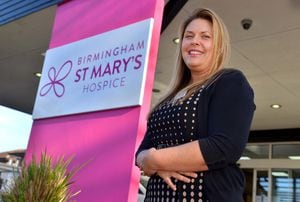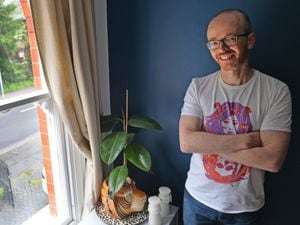Listening ear and support: What it's like to be a clinical nurse specialist at a hospice
She’s a listening ear and friendly face to patients; helping them to live well with a life-limiting illness and supporting them in their final days.

As a clinical nurse specialist, Laura visits people in their own homes to offer practical and emotional care and support to both them and their loved ones.
It’s her job to manage painful and sickness symptoms but also look at ways in improve their mental and emotional wellbeing so they can make the most of the time they have left.
And she will also be by their side at the end of their journey helping to ensure they die in comfort and dignity while providing support to their families.
“It’s a real privilege to be invited into someone’s home and to be part of such a private moment.
“The support they receive from the hospice enables them to be where they want to be at the end of their life and to die with peace and dignity.
“That’s what we are here to do, we listen to what’s important to them and what matters to them, we help them with their choice and make sure it’s how they want it to be,” explains Laura, who lives in Quinton.
The 36-year-old works at Birmingham St Mary’s Hospice which this year is marking 40 years of care across Birmingham and Sandwell.
Supporting more than 400 people every day, the hospice, which has 250 members of staff and 400 volunteers, provides care in people’s homes, in the community, at its Day Hospice facility and at the Inpatient Unit.
As well as carrying out home visits, Laura also offers a satellite clinic in Cape Hill, Sandwell, one of four run by the charity, aimed at giving patients more choice.
“We realise that some people might not be comfortable with us going into their homes, they might prefer a more neutral environment. Or they might prefer to come to us at a fixed appointment time rather than us coming to them.
“It’s about patients feeling comfortable and if they are well enough and want to, they can come to us.
“But if there are not well enough, we will obviously visit them at home,” explains Laura who is also a valuable link to the hospice and other services to ensure all of a patient’s needs are met.
Laura began working at the hospice in November 2013 after spending nine years as a sister in intensive care at Queen Elizabeth Hospital Birmingham.
She began as a trainee on a development programme working with a mentor before securing a full-time post as a clinical nurse specialist.
“It’s quite hard to describe job when people ask me what I do. Part of it was what I expected but there is so much to it than I imagined. I love my job, I hoped I would and I do,” says Laura.
Every day starts and finishes at the hospice headquarters in Raddlebarn Road, Selly Park and each morning there is a ‘team huddle’ where they discuss how the patients are getting on and what visits need to be carried out during the shift.
“After this I will go out on my visits. They might be new patients that I’ve never seen before or patients I’ve met once or twice or patients I’ve been seeing for a few months.
“I love meeting patients and it’s a privilege to be able to work with them at a difficult time in their lives and to make their journey a little bit easier,” explains Laura. Her team is keen to dispel the many myths that still surround hospices including that they are just places where people go to die.
While some of them may come in for a few days or weeks towards the end of their lives, many others attend at much earlier stages of their illness as an outpatient.
They may go to St Mary’s just for the day for a range of outpatient and day services or they spend a couple of weeks there while they symptoms are brought under control before returning home again.
“People think a hospice is going to be a sad, depressing and gloomy place but it’s not like that at all. Yes, there can be a little sadness but there is a lot of laughter too.
“We’ve found the word hospice and the connotations that has can make people wary and anxious when we first make contact with them, following a referral, because in their mind a hospice is where they come at the end of their life to die.
“When they get a call from us, it can be a shock and they think their time has come. But end of the life care is just a small part of what we do.
“It’s all about providing a supportive and safe environment for people to come during their illness and for a place for their families and loved ones to be supported.
“The myth about what we do is that it’s all talk about death and dying but it’s actually about talking about life and what’s important to people and what we can do to help them live well,” says Laura.
During her time at St Mary’s there have been many special moments that stick in her memory. “One of my patients got married and I was invited to the wedding. It was lovely to be part of such an important and happy occasion,” says Laura.
For her it’s her dream job. “I love my job. I can’t imagine what I would be doing if I wasn’t a nurse. I look forward to coming to work every day. Yes, it can be hard with emotional challenges but it’s also very rewarding to be making a difference to people’s lives and that outweighs the sadness,” says Laura.
Heather Large





